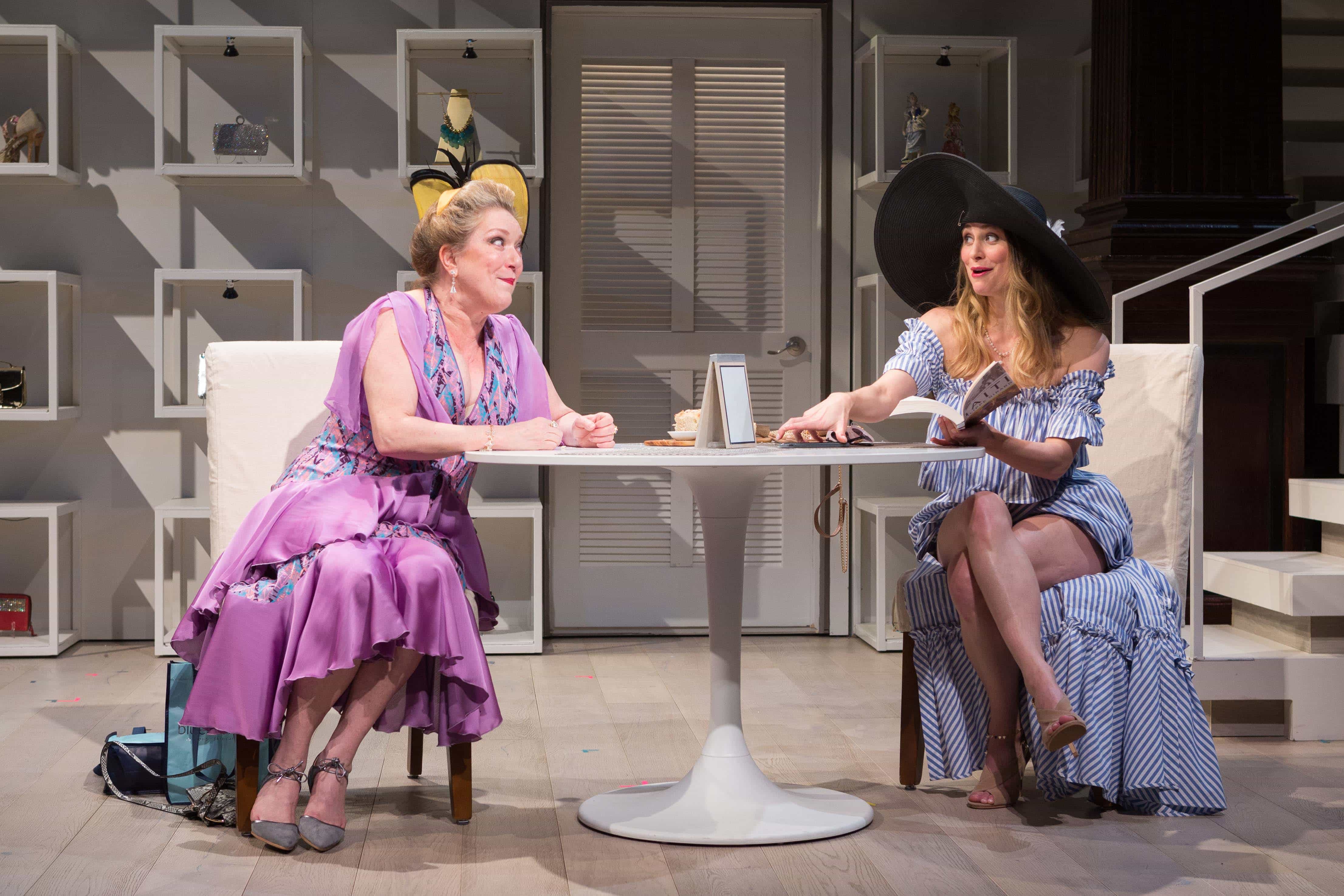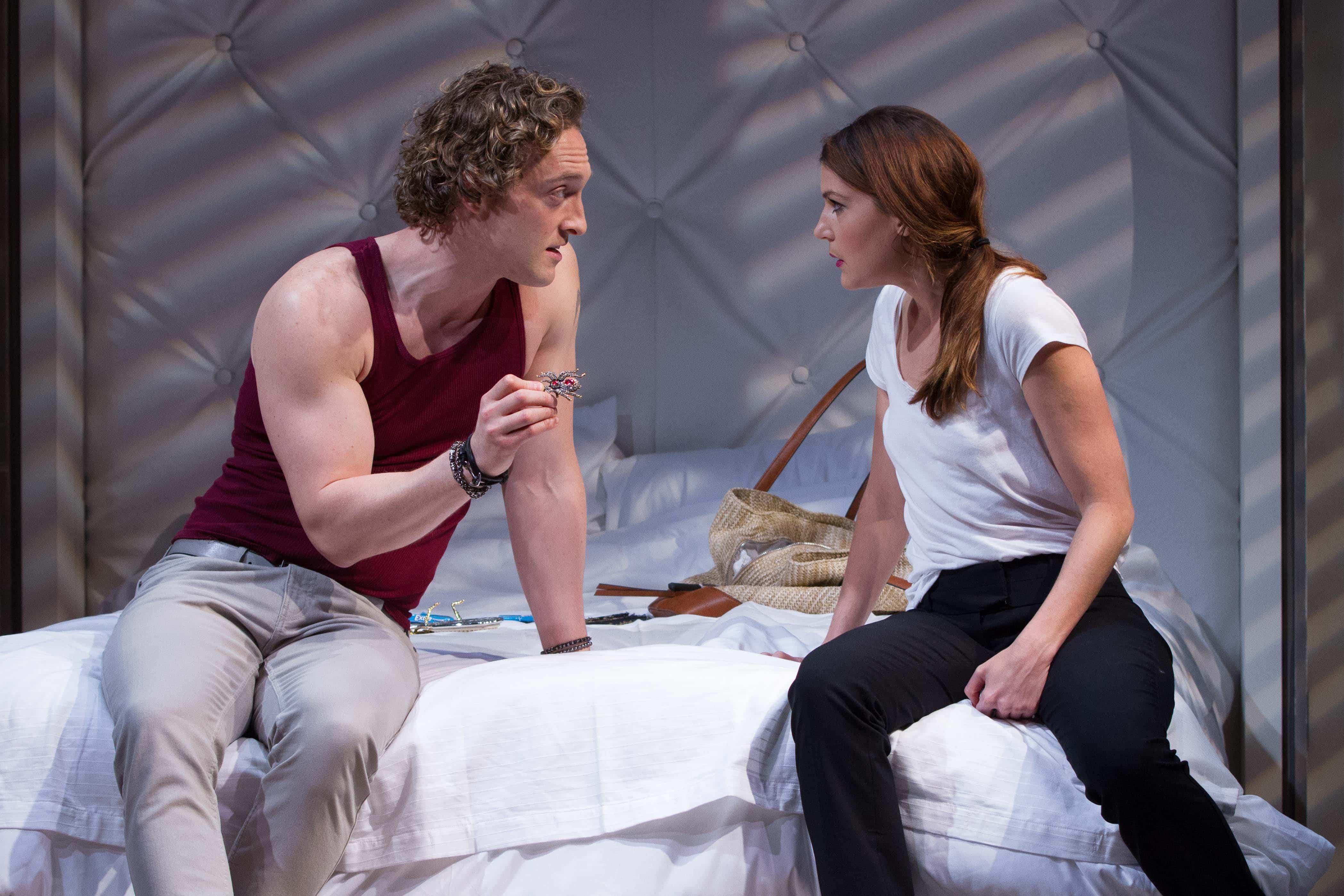Post-Play Palaver is an occasional series of conversations between DC Theater Arts writers who saw the same performance, got really into talking about it, and decided to continue their exchange in writing. That’s what happened when Senior Writers and Columnists Sophia Howes (Dangereuse) and John Stoltenberg (Magic Time!) saw Theresa Rebeck’s comedy The Way of the World, presented by Folger Theater as part of the Women’s Voices Theater Festival.
John: I thoroughly enjoyed this festival entry written and directed by Theresa Rebeck. Sharp, smart, and snappy, it not only satirizes the rich (as did the William Congreve Restoration comedy on which it is loosely based); it skewers modern sexual mores and gender relations from an unapologetically woman-centric point of view. Women’s Voices Theater Festival 2.0 has only begun, so it’s too soon to declare The Way of the World a best of the fest, but this one’s definitely on my shortlist.
In the history of theater classics, the male-centric point of view has been regarded as the universal. One of the things I love about DC’s Women’s Voices Theater Festival is that it offers a framework for playwrights to flip that and for audiences to flip out about that.
Within the WVTF, a play as incisive as Rebeck’s can own a universality onstage that resonates with audience members for whom the way of the world for women is universally a real thing. In the case of Rebeck’s play, there’s a vibe running through it on a frequency that registers on such folks’ inner scanners and keeps going be-boop, be-boop. It’s not that the comedy is written in code; anyone with a brain connected to a funny bone can enjoy it. But there’s a sexual-political subtext that may pass people by who aren’t accustomed, or who are reluctant, to seeing the world through a shrewd woman’s eyes.

In your rave review of the show, you called attention to some of the dramaturgical choices Rebeck made in adapting the Congreve that shifted the play’s point of view from his to hers. I’d be interested in hearing you say more about how you saw that play out.
Sophia: Lady WIshfort (“Wish for it”), in the Restoration piece, is the central figure whose control of her substantial financial resources makes her the most powerful woman in the play. But on a personal level, she is pathetic. She is an aging, lonely widow whose daughter says “will do anything to get a husband.” Our hero, Mirabell, wants to marry her niece, Millamant, but Millamant needs her aunt to approve the match in order to receive her dowry. Unfortunately Lady Wishfort believes that Mirabell has scorned her. She is in no mood to oblige, and much of the action is focused on the success or failure of an elaborate scheme Mirabell has devised to gain her consent.
In Rebeck’s play, Lady Wishfort is called Rene. Her niece Millamant has been transformed into Mae. She stands to inherit, instead of a considerable dowry, 600 million dollars. The two women are devoted to one another. Indeed, one could argue that in Rebeck’s version the central relationship is between Rena and Mae instead of Mirabell and Millamant.
Rene, in a hilarious performance by Tony nominee Kristine Nielsen, is a powerhouse. Like Lady Wishfort she is a mass of insecurities, but when she gets her girl on, look out! Her reactions to what she believes to be code words for “fat” and “old” are irresistibly funny. To see her explain why the one percent are “job creators” is like watching Sarah Palin bloviate while someone is massacring a turkey right behind her. Rene has to absorb a lot of Neanderthal idiocy about being past it, but in the end she reigns supreme.
Mae, played with heart and nuance by Eliza Huberth, has the independence of a 21st-century woman. She is free to explore her own interests, and to develop a social conscience. When Henry (Luigi Sottile), Rebeck’s Mirabell, suggests that she wants to give all her money away as a love test for him, she laughs in his face.

In Congreve’s play, there are several servants, who all play key roles in the plot. Two of them even get married. Here, the Waitress, played with flawless comic timing by Ashley Austin Morris, becomes our surrogate as she gradually begins to see through the materialism and shallowness of the others.
These rich, complex female characters are the essence of what the Women’s Voices Theater Festival is all about. They see through the men, and laugh at them as well as love them. TIme’s up, they seem to be saying. It is the 21st century now, and women are just getting started.
John: I’m recalling Rebeck’s biting satire of sexism in the workplace, What We’re Up Against (which I reviewed in a “kick-ass” production at Keegan). And one of the things I so admired about her The Way of the World is the way she tackled sexism in the bedroom. Let me explain (with a few minor spoiler alerts).

Henry, the play’s lusty lothario (a charmingly nuanced Luigi Sottile), manages to bed each of the women in the play. When the play begins, he has already slept with both Mae, whom he’s in pursuit of, and her aunt Rene, “to be polite.” When Henry gets around to getting it on with Katrina, their post-orgasm scene becomes a classic sendup of male self-absorption. Instantly afterward Henry gets on his smartphone, distracted and aloof from the woman with whom he just had great sex. She’s like WTF. And it’s hilarious. Later Rebeck stages an identical post-orgasm scene between two men (you’ll have to guess who). They’ve just had great sex. Immediately one of them gets on his smartphone, distracted and aloof from the other man, who’s like WTF—and it’s every bit as hilarious as before. The observation that many a straight man goes incommunicado post-coitally has become a trope in rom coms. But Rebeck—without a smidgen of homophobia, I might add—shows us a gay man shutting down post-sex intimacy exactly the same way.
I thought the parallelism between those two scenes was brilliant. I can’t imagine a male playwright, gay or straight, pulling off what Rebeck does there. It’s the sort of dramaturgy grounded in women’s experience IRL that could make some folks’ internal scanners light up with delighted recognition—and make for some squirms among others.
Though Rebeck has several characters say “I hate men” at several points—and it always gets a laugh—the sendup of men that runs through the play is actually quite mild mannered, by no means antagonistic. That’s also the tonality the play uses to satirize the very wealthy. At one point the Waitress, who addresses the audience directly and is cleverly the play’s voice of class consciousness, declares in angry exasperation, “Rich people are terrible tippers.” It’s a funny moment, not least because her fury is real. But right away she pulls her punch, referring to us the audience almost graciously: “Well, not all of them.”
Just as there’s a gentle #NotAllRich motif in the play (Mae’s commitment to use her fortune to aid Haiti is genuine), there is also a clearly intentional #NotAllMen undercurrent. This is most evident in the character arc of Reg (a terrific Elan Zafir). Described as a “throwback,” Reg appears first in the play as an overgrown fratboy without a scintilla of sensitivity. I won’t give away how Rebeck lets us know that inside Reg’s brusque cover is a very different book, but it happens in a surprisingly sweet scene.

The Way of the World never gets polemic—it’s borne along on a wickedly merry momentum, one that had me smiling throughout and LOLing a lot. But there’s something about the way structurally Rebeck interweaves the play’s wealth-disparity consciousness with its sex-class conscious that makes it, for me, just a stunning achievement. Plus, knowing that she directed this production, meaning that every moment was being played exactly the way she meant it—every comeback, every canoodle—well, that was icing on cake.
Sophia: Rebeck faced the same dilemma Congreve did in the late 17th century: how to make a play with mean-spirited people in it funny? It might seem easy to fans of Veep, for example, but it really isn’t. On television a laugh track will do the trick, but, thank goodness, there is no laugh track in the theater.
John has expertly analyzed some of the sexual politics. I also want to highlight something that doesn’t always get mentioned: the extra touches which make a play so much more fun. The kisses the women exchange, utterly insincerely. The wildly disparate reactions the friends have to “modern” art; and the way women sometimes moderate their opinions in the presence of men they want to attract. The way Charles carefully turns up the sheets before sitting on a bed that has been recently used to great effect.These are the moments which make the playwright’s world come alive for us.
In the 1600s, women had few political rights, and when they got married had to relinquish their property to their husband’s control and depend upon him for their livelihood. Today, women can vote and handle their own financial assets. Many women work outside the home. That is, however, no remedy for the other obstacles women face every day: sexual harassment, wage discrimination, and the need to balance marriage and career, which falls disproportionately on them. Rebeck shows us both how far we have come, and how far we have left to go.
Running Time: Two hours 15 minutes, including one intermission.
The Way of the World plays through February 11, 2018, at Folger Theatre – 201 East Capitol Street, SE, in Washington, DC. For tickets, call the box office at (202) 544-7077, or purchase them online.
Theresa Rebeck (Playwright and Director)

LINK:
Review: ‘The Way of the World’ at Folger Theatre (Women’s Voices Theater Festival) by
VIDEO:





